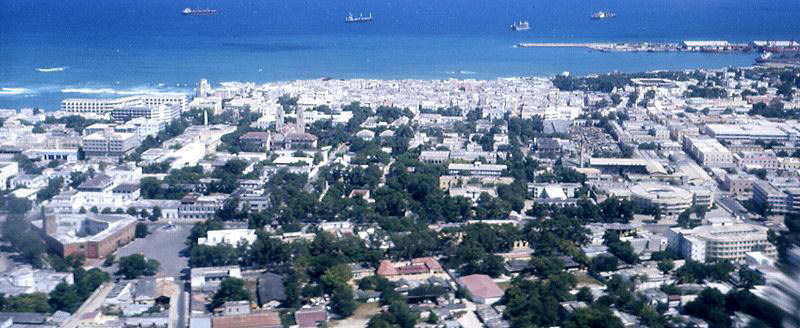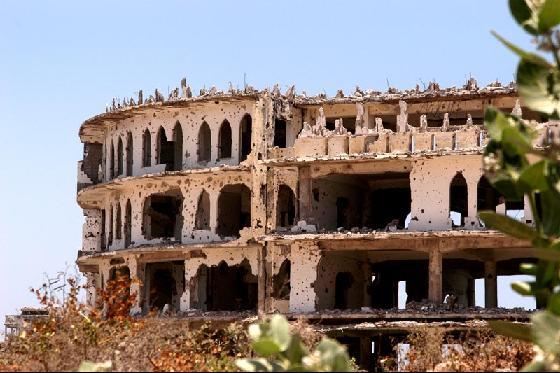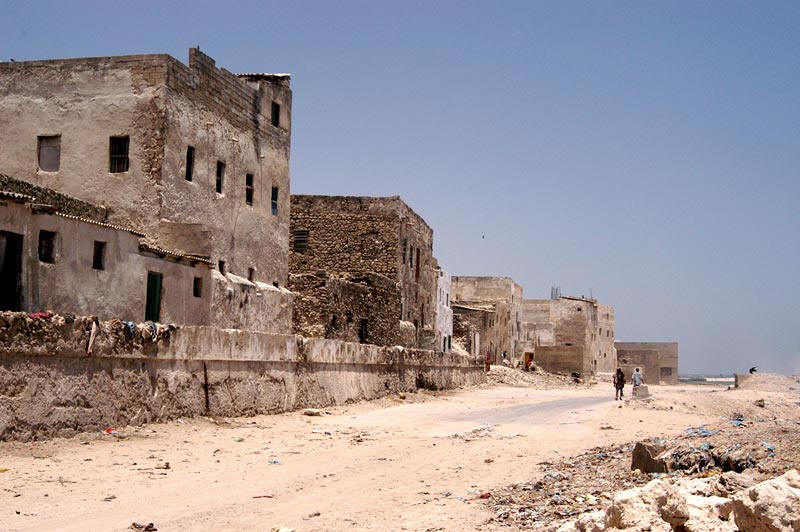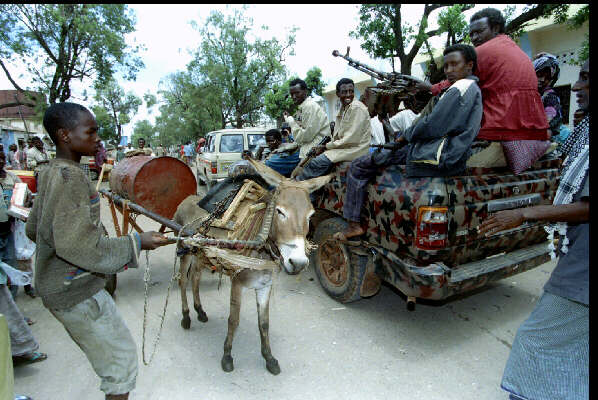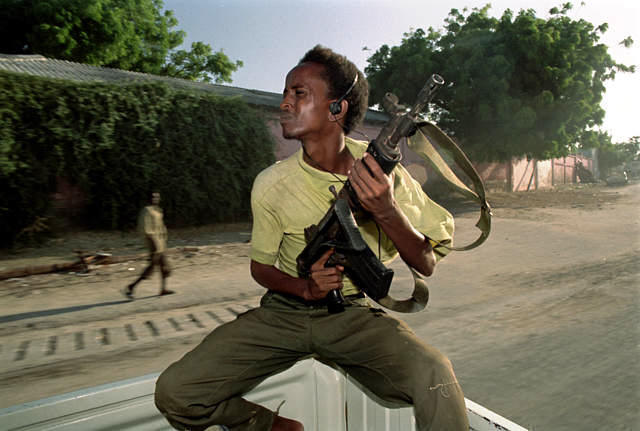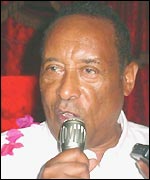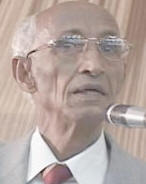| Zooming into the Past |
|
M O G A D I S H U C I V I L W A R S
Zooming into the 1990s interviews and statements, given by the spokespersons and leaders of Somali factions, enables us to prove that clan-animosity account of the Somali civil war has not been given the scholarly attention that its magnitude warrants, even after sixteen years of clan-warfare. This clan-animosity feeling can in fact be derived from faction joint communiqué and statements; and therefore, posting selections of these public relation statements should be a matter of concern to all Somalis – particularly, to those who are in the field of Somali Studies.
After all, clan factionalism disguised in English acronyms (formed from three or four initial letters which include the sacrosanct letter “S”) are now facts of life for Somalis. The words and deeds of the turbulent faction followers have ordained to presuppose that faction spokespersons assumed a monumental role in fuelling clan-hatred. As a result of that, the Forum rushes in to investigate and share with you excerpts of faction communiqués, hoping to find solutions to the current tragic political situation in Somalia. From our perspective, these selections are indeed those that Western scholars/(Somalists) most neglected, or could offer hints to the causes of the civil war.
J A N U A R Y 29, 1 9 9 1
Silanyo Dr. Mirreh
Reaction to USC Presidential Appointment Noted
Senior SNM Member Comments London BBC World Service in English 1709 GMT 30 Jan 1991 [From the "Focus on Africa" program]
The new order in Somalia is apparently not to the liking of all the opposition rebel movements. Yesterday, Ali Mahdi Mohamed became interim president 3 days after USC [United Somali Congress] rebels took control of Mogadishu following four weeks of street fighting in the city. President Siyaad Barre is apparently on the run but Omar Arteh, who was made prime minister by Siyaad Barre last week, keeps his job. The new administration is telling government soldiers to surrender to the local rebel movements, the SNM [Somali National Movement] in the north; the USC in central Somalia; and the Patriotic Movement in the south. But the SNM seems to be disgruntled about events in Mogadishu with its nose rather put out of joint. Robin White asked senior SNM member Ahmed Silanyo what they were unhappy about:
[Silanyo] Well, after all, it is not a question of being unhappy. It is, first of all, a question of principle. Let me say right from the start, I know at least seven of those people and they are very admirable people and we have a great deal of respect for them. And we can understand the situation in which Mogadishu is, but the principle is that there has been an agreement between the organizations, the liberation movements themselves, long before Siyaad Barre was gone, that organizations will liberate certain areas in which they have much support and that any future government – temporary or otherwise – would come only through consultation between the various liberation movements and that has not happened.
[White] But Ali Mahdi Mohamed, the new president has said that he is willing to talk to you about anything you want to talk about now. Are you going to talk to him, negotiate with him, or what will you do?
[Silanyo] Well, a president is appointed by organizations or elected by the people of the country. So, SNM has not been consulted on that, how could they possibly accept it?
[White] So, are you refusing to recognize the new president, the prime minister?
[Silanyo] Well, it is quite clear, there is no question of recognition of that. SNM is controlling part of the country, and so are the other liberation movements. We are very much in support of USC, for instance, to establish [words indistinct] to make peace and order, law and order, and to establish security in the Mogadishu area, or areas under their control, and that is a very, very admirable thing. That is exactly what we want to do in the areas which are under our control, but we obviously cannot accept a government that has been established by either Siyaad Barre or established by a single organization or individuals who have elected themselves.
[White] Many people outside Somalia will find it pretty hard to believe that now you have got rid of Siyaad Barre and already you are quarreling amongst yourselves.
[Silanyo] No, no, no. This is not a quarrel. We will agree, I am quite sure. I am very optimistic that very soon, there is going to be an agreement. The only problem in the country was Siyaad Barre and his troops. But, there is no hurry to rush to appoint a president [words indistinct] when everything is still ...[changes thought] some of these forces are still there while the leaders of the organizations have not met. That, I think, is the (?only) thing. But, we are not fighting among ourselves, far from it.
[White] So, you are not going to rush into Mogadishu and start fighting the USC and say: Get out of the way. We control much of the country, we are the strongest.
[Silanyo] No, no, no. Out of the question. Out of the question. We will come together and definitely, we will choose an interim government or whatever, but simply something which we have all agreed upon. [end recording]
SSDF Official Reacts
London BBC World Service in English 1709 GMT 31 Jan 1991 [From the "Focus on Africa" program]
[Text] The appointment of a new interim president in Somalia, Ali Mahdi Mohamed, by USC [United Somali Congress] rebels who took control of Mogadishu four days ago, putting Siyaad Barre to flight can, hardly be said to have unified the country. There are reports of a continuing exodus of refugees towards and other rebel groups such as the SNM [Somali National Movement], and even elements of the USC are unhappy with the Mogadishu appointments because they were not consulted. On the line to Nairobi, Robin White asked veteran exiled opposition figure, Hassan Ali Mireh, of the SSDF [Somali Salvation Democratic Front] what he felt about these reservations.
[Begin recording] [Mireh] We agree with them really and we have seen that this a national problem and there should be a national solution to it and not just the solution imposed by one party or by any one movement or by any one group, otherwise there can be no real, genuine peace in the country. At the same time, there is not really a government that covers the whole territory and we feel it leads really to more confusion, to more conflict and that is not what Somalia needs. We have suffered enough.
[White] So, what do you want to happen now?
[Mireh] Well, we would like to see a meeting, a conference of opposition movements, of elders, of the Manifesto Group, of the USC itself and to sort out, discuss the problems nationally, have a real dialogue and I think that we do not care who becomes the president. It is not be a problem for the country who is the president. The problem for the country is to have a government, a genuine democratic government, agreed upon by all Somalis.
[White] Where should this meeting take place?
[Mireh] Well, I think it should take place somewhere, let us say, in a friendly country. At this moment, Somalia itself is not safe. The capital of Somalia is not really a safe place to hold a meeting.
[White] Why not?
[Mireh] It is confused. It is still in the shock of the terror that happened between the departing dictatorship and the new victors in the field. So, it is not really safe. Refugees are pouring out of the country into Kenya. So, under such atmosphere, it is very diw?icult to hold a free national conference.
[White] How about you going back there yourself to join in the dialogue?
[Mireh] Well, the organization, as you know, will appoint someone; whether it is me or some other individual or what not. It is not a matter of an individual, it is a matter of the principle, you know, that there should be a meeting of the opposition forces in the interest of really arriving at a national solution rather than, you know, some form of solution imposed upon the country.
[White] Don't you feel that this government now needs some support and people like yourself, elder statesmen like yourself should rush back home and give them some support?
[Mireh] That is a good question. They should have really realized that. And instead of forming a government, they should have called a meeting to show a really good faith to the country, so that they can win the trust of the people, the trust of the opposition movements. But now, everything, you know, is shrouded with distrust and suspicion. Why the rush to establish a presidency and prime ministry, is that the solution?
[White] You said that refugees were continuing to flee the country. What kind of numbers are they arriving in?
[Mireh] I really cannot tell you the numbers, but Kismaayo, which is the southern tip closer to the borders of Kenya, is really over-flooded with refugees. People are running away, and most of them are trying to come to Kenya. [end recording]
|
